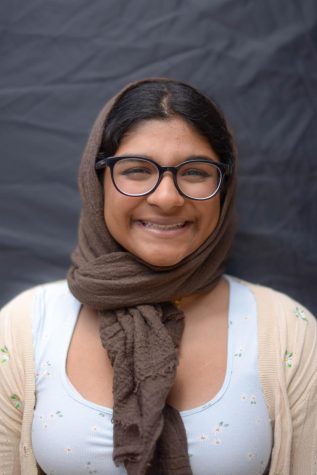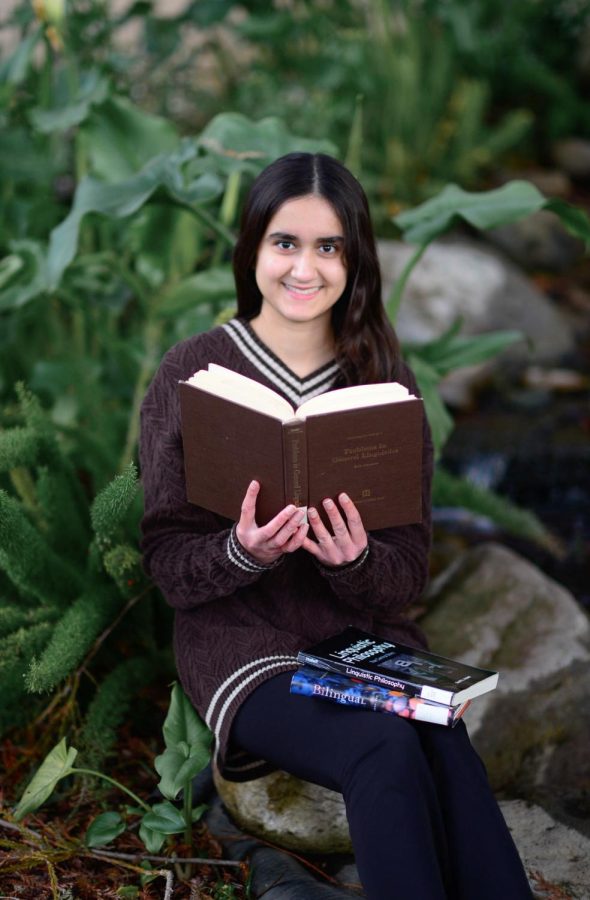Humans of Harker: Connecting the world through language
Isha Moorjani discovers the heart of linguistics
“As I’ve grown up, I’ve also started to appreciate the vast communicative ability that language possesses. When you learn a language, that opens up so many doors to new conversations you can have or new perspectives you can learn. Language connects the world,” Isha Moorjani (12) said.
Hindi. Spanish. Sindhi. Mandarin. These are the languages that filled Isha Moorjani’s (12) life, shaping the way she views the world. She remembers hearing snippets of Hindi and Sindhi in her home and studying Mandarin in school in Singapore, where she lived for six years. Even at just 3 or 4 years old, the exposure to this medley of languages instilled in Isha a love for words. After moving from Singapore to the U.S. with her family, Isha began to study Spanish, falling even more deeply in love with the contexts and subtle beauties of the language.
In freshman year, during a conversation with her math teacher, Isha first heard the word “linguistics.” She remembers searching up linguistics that day on the bus ride home and discovering all its wondrous subfields: psycholinguistics, historical linguistics, neurolinguistics and more. Since then, Isha immerses herself in the variety of this subject, exploring linguistics through academic research.
This year, she is pursuing research in historical linguistics, analyzing how Chilean Spanish has been influenced by the Indigenous languages of Mapudungun and Rapa Nui. Even though historical linguistics is often less known than other fields in linguistics, Isha appreciates its nuances, learning about human pasts through the lens of language.
“I really like historical linguistics, which is what I’m exploring through Near Mitra,” Isha said. “I enjoy learning how languages have developed over time and what factors have contributed to create the languages that we know and speak today — I feel like that is a lesser appreciated facet of language, and it’s truly fascinating.”
Isha remembers feeling unmoored while applying for Near Mitra, unsure about how to combine her interest in Spanish culture with her love for linguistic study. Relying on support from her mentors, who became her anchors, she found guidance in the process of distilling her topic into a year-long research pursuit. Navigating through a sea of articles written in a language that is not her first, Isha took on the challenge to investigate this complex topic.
“Just the support that I got from my [mentors and] teachers and just how welcoming they were and how willing they were to help me crystallize my ideas was really inspiring to me,” Isha said. “It’s been a journey: many of the sources that I’m reading are written in Spanish about complex linguistic concepts, so it has been a bit of a challenge to navigate those academic sources, but it’s really rewarding and fulfilling as well.”
Upper school Spanish teacher Abel Olivas has watched Isha blossom in her linguistic abilities and push herself in her foreign language study, taking AP Spanish Language concurrently with the post-AP elective in her sophomore year. He appreciates her extremely bright, talented and deeply reflective nature, which allows her to reach profound insights in Spanish class.
“Her Spanish is amazing: she speaks really fast and with a lot of precision; it’s very advanced,” Olivas said. “She stands out, just how talented and strong she is linguistically.”
Journalism also influences Isha’s perspective on reaching out to and connecting with others. As the current co-editor-in-chief of Harker Aquila, Isha reflects on her growth in journalism, a program she has been part of for the past four years. When she first joined journalism, Isha remembers feeling nervous before interviews. Becoming assistant news editor in her sophomore year, she was tasked with covering global stories and interviewing professors in different countries, assignments that helped her grow her confidence.
“As a senior, I’m seeing myself do things that I as a freshman would be very nervous to do, like going up to people for interviews or just being more confident about my abilities as a journalist,” Isha said. “Seeing that change in myself over time from someone who is scared to raise her hand or to participate in journalism class to someone who is helping lead and helping teach other younger reporters has been fulfilling.”
While Isha initially felt worried about interviews, she learned to instead focus on opening herself to the possibilities of journalism, enjoying the nuances of the process and valuing the work she does for her community.
“As a student journalist, you have the opportunity to tell other people’s stories and talk to people who you may not have talked to before,” Isha said. “Appreciating the journey of growth and the day to day work that we do without necessarily focusing on the end outcome all the time has helped me grow and really enjoy the work that I do in journalism.”
Isha’s friends value the way she dedicates herself to both her activities and her relationships, taking time to remember the daily experiences of her friends and follow up on them. When they need advice or have questions, Isha is always there for them as a comforting presence and support system.
“She’s a very dedicated person, whether it is journalism, school or even just helping someone — that’s a really unique quality about her,” close friend Keesha Gondipalli said. “She’s very reliable, but she’s also really fun to hang around.”
Isha’s immersion in language — through both journalism and linguistics — informs the way she walks through the world, helping her remember to embrace the peace of her present moment. She cherishes small moments with her friends and family where she can express herself fully, taking a break from schoolwork to spend time with people who make her feel whole.
“Each language has its own little details that are so beautiful, but they sometimes go unnoticed just because they’re so small,” Isha said. “We lead such busy lives that we tend to focus more on that rather than what’s going on around us in the present moment, so taking a step back and focusing on where I am in the present moment really grounds me.”
Her family has continued to be a warm and permanent force in Isha’s life, helping her feel grounded in the present. Isha values all the heartwarming and loving moments she shares with them, and whenever she experiences a bad day, she knows she can count on her family to comfort her.
“Throughout my life, I’ve really grown to value my family because they’re my constant,” Isha said. “They’re my rock. I know I can go to them with anything, and they’ll always support me and cheer me up and just shower me with so much love. I’m eternally grateful for them.”
Isha pours back this love into her own friendships with others. Close friend Austina Xu (12) first met Isha when they were both new-to-Harker sixth graders, choosing to room with one another for the class trip on a whim. Austina appreciates Isha’s openness and thoughtfulness and can always count on her humor to alleviate the gravity of a difficult situation.
“She’s hilarious without realizing it, which is the best kind of humor,” Austina said. “She’s very detail-oriented and meticulous, which I find really admirable, and it goes with her really robust work ethic. When she talks about the things she’s passionate about, she becomes so excited, and it’s really fun to see that bubbling of energy and passionate enthusiasm.”
Linguistics also influences other areas of Isha’s life, inspiring her to reach her personal goal of learning more languages throughout her life. She has grown to value language for not only its aesthetics but for its deep-rooted ability to invoke human togetherness.
“As I’ve grown up, I’ve also started to appreciate the vast communicative ability that language possesses,” Isha said. “When you learn a language, that opens up so many doors to new conversations you can have or new perspectives you can learn. Language connects the world.”
As Isha moves through high school, she is learning not to push herself to be perfect, but rather to fully enjoy her journey. She remembers coming across a quote from John Steinbeck that stuck with her, shaping her perspective: “And now that you don’t have to be perfect, you can be good.” Prioritizing her own joy over the external result of her perfection liberates her, allowing her to feel completely satisfied with her experiences.
“I’ve learned to appreciate stepping back and taking a moment to just make sure that I feel happy with what I’m doing,” Isha said. “The quote reminds me that rather than focusing on that end outcome of reaching perfection, it’s more important to not only enjoy what you’re doing and make sure that it makes you feel happy, but also make sure you’re approaching that with goodness in your heart.”

Sarah Mohammed (12) is the co-editor-in-chief of the Winged Post, and this is her fourth year on staff. This year, she is excited to help make beautiful...


















![“[Building nerf blasters] became this outlet of creativity for me that hasn't been matched by anything else. The process [of] making a build complete to your desire is such a painstakingly difficult process, but I've had to learn from [the skills needed from] soldering to proper painting. There's so many different options for everything, if you think about it, it exists. The best part is [that] if it doesn't exist, you can build it yourself," Ishaan Parate said.](https://harkeraquila.com/wp-content/uploads/2022/08/DSC_8149-900x604.jpg)




![“When I came into high school, I was ready to be a follower. But DECA was a game changer for me. It helped me overcome my fear of public speaking, and it's played such a major role in who I've become today. To be able to successfully lead a chapter of 150 students, an officer team and be one of the upperclassmen I once really admired is something I'm [really] proud of,” Anvitha Tummala ('21) said.](https://harkeraquila.com/wp-content/uploads/2021/07/Screen-Shot-2021-07-25-at-9.50.05-AM-900x594.png)







![“I think getting up in the morning and having a sense of purpose [is exciting]. I think without a certain amount of drive, life is kind of obsolete and mundane, and I think having that every single day is what makes each day unique and kind of makes life exciting,” Neymika Jain (12) said.](https://harkeraquila.com/wp-content/uploads/2017/06/Screen-Shot-2017-06-03-at-4.54.16-PM.png)








![“My slogan is ‘slow feet, don’t eat, and I’m hungry.’ You need to run fast to get where you are–you aren't going to get those championships if you aren't fast,” Angel Cervantes (12) said. “I want to do well in school on my tests and in track and win championships for my team. I live by that, [and] I can do that anywhere: in the classroom or on the field.”](https://harkeraquila.com/wp-content/uploads/2018/06/DSC5146-900x601.jpg)
![“[Volleyball has] taught me how to fall correctly, and another thing it taught is that you don’t have to be the best at something to be good at it. If you just hit the ball in a smart way, then it still scores points and you’re good at it. You could be a background player and still make a much bigger impact on the team than you would think,” Anya Gert (’20) said.](https://harkeraquila.com/wp-content/uploads/2020/06/AnnaGert_JinTuan_HoHPhotoEdited-600x900.jpeg)

![“I'm not nearly there yet, but [my confidence has] definitely been getting better since I was pretty shy and timid coming into Harker my freshman year. I know that there's a lot of people that are really confident in what they do, and I really admire them. Everyone's so driven and that has really pushed me to kind of try to find my own place in high school and be more confident,” Alyssa Huang (’20) said.](https://harkeraquila.com/wp-content/uploads/2020/06/AlyssaHuang_EmilyChen_HoHPhoto-900x749.jpeg)



